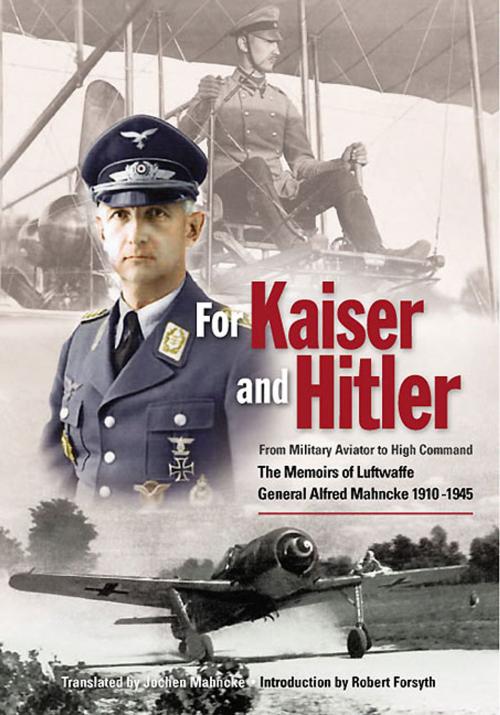For Kaiser and Hitler: From Military Aviator to High Command - The Memoirs of Luftwaffe General Alfred Mahncke 1910-1945
From Military Aviator to High Command - The Memoirs of Luftwaffe General Alfred Mahncke 1910-1945
Nonfiction, History, Germany, Modern, 20th Century| Author: | Mahncke, Jochen | ISBN: | 9780955597770 |
| Publisher: | Tattered Flag | Publication: | May 28, 2011 |
| Imprint: | Tattered Flag | Language: | English |
| Author: | Mahncke, Jochen |
| ISBN: | 9780955597770 |
| Publisher: | Tattered Flag |
| Publication: | May 28, 2011 |
| Imprint: | Tattered Flag |
| Language: | English |
The memoirs of General der Flieger a.D. Alfred Mahncke are the first from a former General of the German Luftwaffe to be published in the English language since those of Generalfeldmarschall Albert Kesselring in 1953. Since then, thousands of books have been written on every aspect of the Luftwaffes history, development, personalities, aircraft, campaigns, operations and ultimate defeat. But the historiography has lacked a fresh, detailed and personal insight into the leadership and command of the Luftwaffe from its earliest years through to the period of crisis which ensued after the tragedy of Stalingrad. Alfred Mahnckes For Kaiser and Hitler rectifies this omission, providing those with an interest in the history of the German military machine with an absorbing, detailed, highly readable and evocative account of life within the Luftwaffe at senior command level.Yet Mahnckes account is much more than that for as he states, his is a story spanning …the national autocracy of the Monarchy and the unsuccessful parliamentary democracy of the Weimar Republic, to the failed National Socialist dictatorship. It is also a chronicle of the very beginnings of military aviation. Mahncke was among the first German military aviators and flew with the Kaisers fledgling air unit in 1911, witnessing and experiencing the exhilaration and dangers of flying in some of the earliest military planes. He met the Kaiser, the German Crown Prince and various members of the Imperial royal family, as well as Hindenburg and many prominent German political and military figures. He flew in an early Zeppelin airship. By the outbreak of the First World War, Mahncke was an experienced pilot and he flew subsequently over the Western and Eastern Fronts, before assuming staff positions in France and Russia where he controlled tactical air operations. He went on a dive in a German U-boat in 1915 and later traveled to Palestine. He also suffered, and describes in highly graphic and emotional terms, the carnage and horror of the trench warfare on the Western Front in 1917. In the dark years of the interwar period following in the wake of the Versailles Treaty, Mahncke served in senior positions with the military police and his writing offers a valuable insight into life in the Weimar Republic and of the uncomfortable rise of National Socialism and Adolf Hitler whom he first met in 1933 from the viewpoint of the German conservative middle classes and the military. He met Charles Lindbergh and attended the controversial 1936 Olympic Games in Berlin as well as the Nuremberg rallies where he shared a podium with the Führer. In 1935, he joined the fledgling Luftwaffe, experiencing from his position as overseer and champion of air sport in the Third Reich at firsthand the politics, personalities and measures of stealth used to rebuild German air power under Nazi control. He witnessed, and describes vividly, the emergence of an awesome but not flawless new force in aviation and its eventual deployment in Hitlers invasion of Russia in June 1941, culminating in the drive into the Caucasus and Crimea and the advance on the Volga. Mahncke was deeply involved in Luftwaffe operations at Stalingrad and later in the Kuban in 1943, before moving to Italy, where he coordinated the desperate German air defense of Sicily ahead of the slow, tenacious defense and ultimate retreat through the Italian mainland throughout 1943 and 1944. Mahncke met and worked with Göring, Udet, Milch, Kesselring, Jeschonnek, von Richthofen and many other senior commanders of the Luftwaffe and German armed forces. He describes their strengths and weaknesses, as well as their vision or lack of it. For Kaiser and Hitler is unapologetic, honest, readable and engaging. It provides an intriguing insight for those with an interest in the air power and military history of the First World War and the Third Reich and forms an important resource for scholarship.Translator Jochen O.E.O. (John) Mahncke was born in Königsberg, East Prussia in 1926. While attending high school in Berlin, he was conscripted as an anti-aircraft auxiliary in the Flak defense of Berlin from February 1943 to mid-1944. He joined the Wehrmacht as a Panzergrenadier in 1944 and was dispatched to Italy where he served as an NCO (Officer Cadet). He was taken Prisoner of War by American forces in May 1945 and handed over to the British later that year and was shipped to North Africa. He was held in various PoW camps at El Dabbah, near El Alamein, until 1947. In mid-1947 he was moved to Cairo and then to the Suez Canal Zone where he served in a guard unit intended to protect British troops in their camps. By the time he was repatriated to Germany at the end of 1948, he was working as an assistant paymaster for the British administration at Port Said/Port Fouad. Upon returning to Germany he took up an apprenticeship with an import/export business in Hamburg, but emigrated to South Africa in 1957 where he now lives with his wife and where he worked in the printing and packaging industry in Johannesburg and Cape Town until retirement in 1992. He has two sons and four grandchildren. Jochen Mahncke is author of U-Boats and Spies in Southern Africa: Anecdotes, Legends, Stories (Cape Town, 2007) and is an Honorary Life Member of the South African Military History Society.
The memoirs of General der Flieger a.D. Alfred Mahncke are the first from a former General of the German Luftwaffe to be published in the English language since those of Generalfeldmarschall Albert Kesselring in 1953. Since then, thousands of books have been written on every aspect of the Luftwaffes history, development, personalities, aircraft, campaigns, operations and ultimate defeat. But the historiography has lacked a fresh, detailed and personal insight into the leadership and command of the Luftwaffe from its earliest years through to the period of crisis which ensued after the tragedy of Stalingrad. Alfred Mahnckes For Kaiser and Hitler rectifies this omission, providing those with an interest in the history of the German military machine with an absorbing, detailed, highly readable and evocative account of life within the Luftwaffe at senior command level.Yet Mahnckes account is much more than that for as he states, his is a story spanning …the national autocracy of the Monarchy and the unsuccessful parliamentary democracy of the Weimar Republic, to the failed National Socialist dictatorship. It is also a chronicle of the very beginnings of military aviation. Mahncke was among the first German military aviators and flew with the Kaisers fledgling air unit in 1911, witnessing and experiencing the exhilaration and dangers of flying in some of the earliest military planes. He met the Kaiser, the German Crown Prince and various members of the Imperial royal family, as well as Hindenburg and many prominent German political and military figures. He flew in an early Zeppelin airship. By the outbreak of the First World War, Mahncke was an experienced pilot and he flew subsequently over the Western and Eastern Fronts, before assuming staff positions in France and Russia where he controlled tactical air operations. He went on a dive in a German U-boat in 1915 and later traveled to Palestine. He also suffered, and describes in highly graphic and emotional terms, the carnage and horror of the trench warfare on the Western Front in 1917. In the dark years of the interwar period following in the wake of the Versailles Treaty, Mahncke served in senior positions with the military police and his writing offers a valuable insight into life in the Weimar Republic and of the uncomfortable rise of National Socialism and Adolf Hitler whom he first met in 1933 from the viewpoint of the German conservative middle classes and the military. He met Charles Lindbergh and attended the controversial 1936 Olympic Games in Berlin as well as the Nuremberg rallies where he shared a podium with the Führer. In 1935, he joined the fledgling Luftwaffe, experiencing from his position as overseer and champion of air sport in the Third Reich at firsthand the politics, personalities and measures of stealth used to rebuild German air power under Nazi control. He witnessed, and describes vividly, the emergence of an awesome but not flawless new force in aviation and its eventual deployment in Hitlers invasion of Russia in June 1941, culminating in the drive into the Caucasus and Crimea and the advance on the Volga. Mahncke was deeply involved in Luftwaffe operations at Stalingrad and later in the Kuban in 1943, before moving to Italy, where he coordinated the desperate German air defense of Sicily ahead of the slow, tenacious defense and ultimate retreat through the Italian mainland throughout 1943 and 1944. Mahncke met and worked with Göring, Udet, Milch, Kesselring, Jeschonnek, von Richthofen and many other senior commanders of the Luftwaffe and German armed forces. He describes their strengths and weaknesses, as well as their vision or lack of it. For Kaiser and Hitler is unapologetic, honest, readable and engaging. It provides an intriguing insight for those with an interest in the air power and military history of the First World War and the Third Reich and forms an important resource for scholarship.Translator Jochen O.E.O. (John) Mahncke was born in Königsberg, East Prussia in 1926. While attending high school in Berlin, he was conscripted as an anti-aircraft auxiliary in the Flak defense of Berlin from February 1943 to mid-1944. He joined the Wehrmacht as a Panzergrenadier in 1944 and was dispatched to Italy where he served as an NCO (Officer Cadet). He was taken Prisoner of War by American forces in May 1945 and handed over to the British later that year and was shipped to North Africa. He was held in various PoW camps at El Dabbah, near El Alamein, until 1947. In mid-1947 he was moved to Cairo and then to the Suez Canal Zone where he served in a guard unit intended to protect British troops in their camps. By the time he was repatriated to Germany at the end of 1948, he was working as an assistant paymaster for the British administration at Port Said/Port Fouad. Upon returning to Germany he took up an apprenticeship with an import/export business in Hamburg, but emigrated to South Africa in 1957 where he now lives with his wife and where he worked in the printing and packaging industry in Johannesburg and Cape Town until retirement in 1992. He has two sons and four grandchildren. Jochen Mahncke is author of U-Boats and Spies in Southern Africa: Anecdotes, Legends, Stories (Cape Town, 2007) and is an Honorary Life Member of the South African Military History Society.















